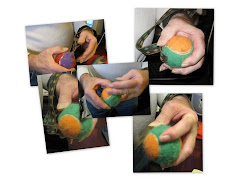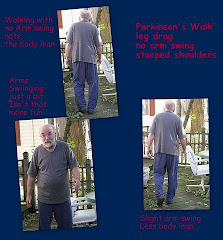We Don't Know Why but Anxiety Is a PD symptom Frankly, at this time, I'm not so concerned with the why but rather the effect of anxiety on Steve's Parkinson's disease progression. While anxiety is not unexpected when one receives a diagnosis, from what I've read, it is a more common symptom in PD than in say Diabetes, Rheumatoid Arthritis and Multiple Sclerosis. As a matter of fact it is a PD precursor symptom, often accompanied by pessimism. I always thought that Steve was over-thinking things and expressing them in a negative way; now I realize that this was a PD potential rearing its head when he was still a young man.
What we do know is that embarrassment is a risk factor for anxiety and social fears. We know that there might be an association with levodopa although probably not the other PD meds. We know that there may be an association with norepinephrine (dopamine is the norepinephrine precursor so you can't have one without the other) and we know that there are several other neural pathways which might contribute. We've got our eye on Serotonin and GABA.
Here's the thing, we know that anxiety was behind
Steve's first bout of dehydration even though the underlying issue was actually Benign Prostatic Hyperplasia (BPH) or enlarged prostate. This in turn exacerbated feelings of urinary incontinence which in its own turn triggered extreme anxiety - enough to stop all fluid intake except for a morning cup of coffee and enough water to swallow pills and supplements. We focused on the dehydration, how to rehydrate and how to get him back on his feet to think and to function on his own again. We treated the cause and he started taking a common (and risky) prostate medication which he had turned down a several years earlier when he and his doctor discussed his prostate issue and actually checked for and ruled out prostate cancer. But we never looked at the other issue - the anxiety which overrode all else.
The treatments for PD anxiety at this time are problematic. Antidepressants of various classes: Tricyclics, SSRIs, Anti-psychotics, Benzodiazepines, and non-selective MAOIs. In early 2010 we just weren't ready to risk the motor symptom treatment for the anxiety/non-motor symptom.
So what happened in the late summer and early fall with
the second round of dehydration? The second time around was easier to spot and know what to do. I was prepared already with electrolyte beverages - mostly fruit flavored. We kept the drinks flowing. He prefers ice water from the pitcher. We had the adult incontinence briefs on hand to relieve the issue of weakened ability to get to the bathroom on time and to get through the night. Although there was no question of doing the right things for recovery, each time there seems to be a larger cognitive deficit.
We recently made some other nutritional supplement changes and I adjusted up and down to determine if they constituted any part of the problem. All the time, the vivid dreams, the hallucinations and illusions increased making Steve's reality very confusing; contributing to the a high anxiety level.
We finally resorted to using an herbal to help with the anxiety after I realized that he was self-medicating with aspirin and found an empty bottle - which had been almost full a week before. I read everything I could find about the herbal components because it does help relieve the anxiety on a short term basis. The best I can say is that it seems to have the fewest contraindicated ingredients. Certainly a better option now than prescription medications.
In addition to retreating to the safety of his bedroom for frequent naps - mostly because he feels anxious, one significant new issue was freezing. We are still working through this problem. Steve now has his
key words to help him through the tight spots but it took 3 months and he intermittently lets panic rule so that he mixes up the words in the commands:
Look Up and
Walk Forward. Mostly they had a calming effect and then anxiety takes over and the words become other words - the wrong commands.
I can now see that fear in his shuffle step. It makes me wonder how many shufflers out there are just plain scared. I hadn't seen it in those movements for many months but now I recognize the enemy. It isn't just postural instability - a precursor or early symptom of his - it is his terror that something bad will happen on the next step.
I know he has recovered just enough arm swing with the new form of buffered creatine monohydrate that he can walk at a slow pace but with a normal balanced stride, shifting his weight from side to side, using his shoulders to propel himself forward (that's Walk Forward) He has to be reminded in the early morning, when he wakes from a nap and in the evening but sometimes he can let himself relax enough to walk without anxiety. That makes my heart sing.
 |
| Watch those stairs |
Our next project will be stairs. He's gone downstairs only a few times since the dehydration but he had few problems going down and none on the way back up. But he is afraid. He sees a black hole and not the steps leading to the 1st floor. He is anxious every time he walks past the stairway. His sister, a nurse, mentioned that perhaps it is eyesight issues which help trigger the fear and we'll check that possibility.
We're looking for solutions to the anxiety, the cognition losses, and the PD psychosis which play a large part in making his world a more frightening place. One possible solution may lie in a clinical trial taking place in our neck of the woods. We provided a link to the
Fox Trial Finder in the right column under
Clinical Trials but how serendipitous to have a reminder email from PAN (Parkinson's Action Network) this morning. I used that link, and looked at trials in our area again and found some new ones. So we sent an email to the
Pimavanserin Trial, heard back promptly with a phone number and are waiting to hear back from the Cleveland Clinic Study Coordinator. We are hoping that if the psychosis can be treated, we can work more effectively to lessen the anxiety.
Addendum 3/12:
On 3/06/12 The Parkinson's Disease Foundation presented an Expert Briefing,
A Closer Look at Anxiety and Depression in Parkinson's Disease led by Dr Laura Marsh. The archived webinar/podcast is now
available at PDF. Listen rapidly as Dr Marsh covered a lot of material in a short period of time. I plan to listen again.




















I Agree. Anxiety is one PD symptom. Thanks for sharing advice on how to control and avoid such anxieties.
ReplyDeleteNice sharing and keep posting.